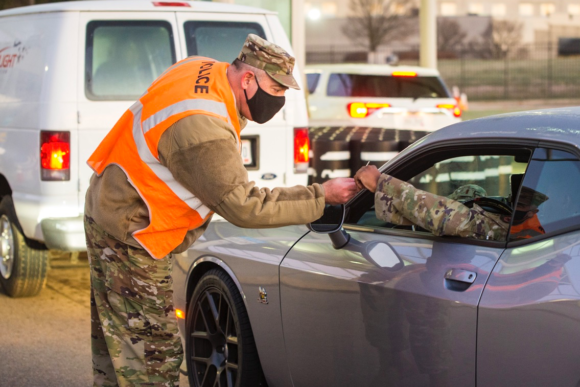Military dependent ID cards unlock valuable benefits for your family members, including healthcare, access to military facilities, commissaries, MWR centers, support agencies and even discounts within your community.
For National Guard and reserves, the cards are slightly different. The National Guard and reserve dependent ID Cards are distinguishable by their reddish color. They provide family members access to the exchange, commissary and morale, welfare and recreation privileges.
When a service member goes on active duty for over 30 days, they can apply for an active duty dependent military ID card to authorize access to medical and MWR benefits and privileges for the duration of the orders.
While it would be nice to walk our loved ones into a DEERS office and declare them our dependents, it’s not that easy. Not everyone is eligible for a dependent ID card.
Who Is Eligible for a Military Dependent ID Card?
The military is specific about who can receive dependent benefits and requires documentation for each individual.
You will need to provide a DD Form 1172-2 and documentation that proves your dependent’s status, like a marriage certificate, proof of enrollment as a full-time student, a medical sufficiency statement or a financial dependency determination.
Your local RAPIDS Office will be able to tell you what documents are necessary when you make the appointment.
- Lawful spouse
- Unremarried surviving spouse
- Unmarried children (includes adopted or stepchildren) under 21
- Unmarried children over 21 but incapable of self-support
- Unmarried children over 21 but under 23 who attend an approved learning institution as a full-time student
Additional eligibility rules apply to former spouses, dependent parents/in-laws and special circumstances. If your dependents fall under these categories, you will need to contact the RAPIDS Office near you for additional information.
At What Age Do Dependent Kids Get Military ID Cards?
Children need to have their own cards at age 10. Before age 10, they can access benefits and healthcare using the parent or guardian’s ID. However, children of all ages may need a dependent ID card if they’re ever in the care of another parent or guardian who isn’t eligible for Tricare so that they can continue to access medical care when the service member isn’t with them.
Where to Get Dependent Military ID Cards
To find active and retired military dependent ID card renewal locations near you, visit the RAPIDS Office Locator & Appointment Scheduler.
When you arrive at your ID card appointment, you will need to bring two original forms of identification. One or both forms can come from the primary identity source document list, but only one can come from the secondary identity source document list.
All identification must be current and not expired.
Primary Identity Source Document List
- Passport or U.S. Passport Card
- Driver’s License or State-Issued ID Card, with Photo
- Military ID Card
- Military Dependent’s Card
- Permanent Resident Card or Alien Registration Receipt Card (Form I-551)
- Foreign Passport
- Employment Authorization Document, with Photo
- Personal Identity Verification (PIV) Card
Secondary Identity Source Document List
- US Social Security Card
- Birth Certificate w/ Official Seal – original or certified copy
- ID Card issued by a federal, state or local government agency or entity with photograph
- Voter’s Registration Card
- U.S. Coast Guard Merchant Mariner Card
- Certificate of US Citizenship (Form N-560 or N-561)
- Certificate of Naturalization (Form N-550 or N-570)
- U.S. Citizen IF Card (Form I-197)
- Identification Card for Use of Resident Citizen in the United States (Form I-179)
- Certification of Birth Abroad or Certification of Report of Birth issued by the Department of State (Form FS-545 or Form DS-1350)
- Temporary Resident Card (Form I-688)
- Employment Authorization Card (Form I-688A)
- Reentry Permit (Form I-327)
- Refugee Travel Document (Form I-571)
- Employment Authorization document issued by the Department of Homeland Security (DHS)
- Employment Authorization Document issued by DHS with photograph (Form I-688B)
- Foreign ID with photograph
- Driver’s License issued by a Canadian government entity
- Native American Tribunal document
When Do Military Dependent ID Cards Expire?
Military dependent ID cards usually need to be renewed every four years. Exceptions may apply to incapacitated dependents and those age 65 and older who don’t have a permanent ID.
To find active duty and retired military dependent ID card renewal locations, go to the RAPIDS site locator. To contact the DEERS Support Office, call (800) 538-9552.
You can replace lost or stolen dependent ID cards online, but they will only be valid for one year.
If you can not physically go to an ID card office because you are disabled or have an incapacitated dependent, you can obtain a new card through the mail. Call the nearest RAPIDS office to verify the mail-in ID card procedure. This process may take anywhere from four-to-six weeks.
Next Generation Uniform Services ID Card
For decades, dependents of active duty and retired service members carried tan-colored laminated ID cards to access military benefits. In July 2020, DEERS began issuing updated retiree and dependent ID cards called the Next Generation Uniform Services Identification (USID) cards.
These cards look more like a military CAC, are more durable and are harder to counterfeit.
DEERS expects to complete the transition by January 2026.
According to the Pentagon, your old ID cards remain valid through their expiration date, so if your old card has not expired, you don’t need to make an appointment for a new one yet.
Retirees must update their ID cards when they become eligible for Medicare. Once updated, your new retiree ID card will never expire.




Comments:
About the comments on this site:
These responses are not provided or commissioned by the bank advertiser. Responses have not been reviewed, approved or otherwise endorsed by the bank advertiser. It is not the bank advertiser’s responsibility to ensure all posts and/or questions are answered.
Jerry Huffstickler says
Help, I am 78, retired Air Force, 100% disabled by Social Security, 80% disabled by VA. I have a doctor’s letter stating I need care 24/7 and can not care for myself. My step daughter has been providing that care for me since July. I have applied for Aid and Attendance thru the VA. What do I need to do on order the get her an ID card. She quit her job in Florida and moved in with me in July. I literally couldn’t function without her. I am 100% of her support i.e. home, food, money. I need her to shop for me at the commissary and BX. She is divorced and her mother has passed. Can you help me?
Ryan Guina says
Jerry,
I recommend contacting the VA regarding the VA Caregiver Support Program.
Here is more information about how to Apply for the Program of Comprehensive Assistance for Family Caregivers.
I wish you and your daughter the best!
Linda JOHNSON says
I am a 71 year old retiree spouse. My ID card expires in 2025. when I last renewed I was 68 years old but was given a 5 years card. When would I be eligible for a permanent card.
Dorlee Kellam says
What about the unmarried widow of a retiree? My ID expires in 4/2025, how often do I need to update my card?
Teresa says
My husband is a retired Navy veteran and works as a civilian at Camp Pendleton. He has not gotten our 12.5 year old daughter her Military ID card so we have continued as always to use my Military ID card to access her medical benefits as well as my own. He does not live with us. He refused to take us to get new cards before the ID expired on May 6th. How long does insurance continue to cover us with an expired Military ID card? What do I do about this situation? He is required to provide Medical Insurance for our daughter through child support services but is it not also viewed as an entitlement granted by the US Government to the dependents of Military veterans and personel?
Anita Kraft says
Why does my recently renewed Spouse ID card expire 4 days before my 65th birthday?
Ryan Guina says
Anita, I believe you need to update your ID because you will need to transition to Tricare for Life at age 65. I recommend contacting your local ID card issuing office for more specific information. Best wishes!